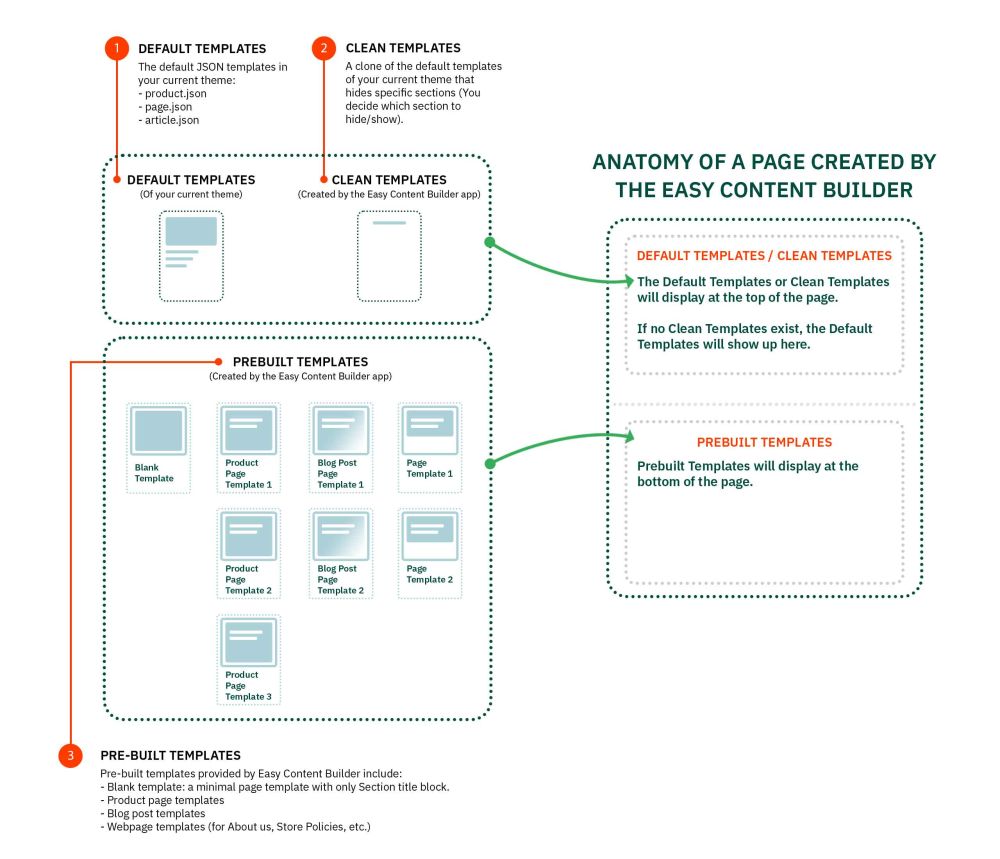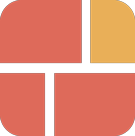Clean Template: Difference between revisions
No edit summary |
No edit summary |
||
| Line 1: | Line 1: | ||
==== What is A Clean Template ==== | ==== What is A Clean Template ==== | ||
A Clean template | A Clean template is a clone of the default templates of your current theme that hides specific sections (You decide which section to show/hide). | ||
It is perfect if you want to exclude content blocks of the default templates and only show up the new content blocks added using the Easy Content Builder. | It is perfect if you want to exclude content blocks of the default templates and only show up the new content blocks added using the Easy Content Builder. | ||
You need to create a separate Clean template for each type of page: '''product page''', '''webpage page''', and '''blog post page'''. Once created, the Clean template files will come with the '''.clean''' suffix (''product.clean.json'', ''page.clean.json'', ''article.clean.json''). | |||
If you do not create a Clean template, all content blocks added using the Easy Content Builder will appear at the bottom of the pages (below the default content blocks of your current page). | Creating a clean template is optional though. | ||
If you do not create a Clean template, all content blocks added using the Easy Content Builder will appear at the bottom of the pages (below the default content blocks of your current page). | |||
[[File:Ecb template anatomy 2.jpg|1000x1000px]] | [[File:Ecb template anatomy 2.jpg|1000x1000px]] | ||
Revision as of 02:07, 21 November 2022
What is A Clean Template
A Clean template is a clone of the default templates of your current theme that hides specific sections (You decide which section to show/hide).
It is perfect if you want to exclude content blocks of the default templates and only show up the new content blocks added using the Easy Content Builder.
You need to create a separate Clean template for each type of page: product page, webpage page, and blog post page. Once created, the Clean template files will come with the .clean suffix (product.clean.json, page.clean.json, article.clean.json).
Creating a clean template is optional though.
If you do not create a Clean template, all content blocks added using the Easy Content Builder will appear at the bottom of the pages (below the default content blocks of your current page).
How to create a Clean template
(work in progress)
Create a Clean template for products:
- From the Shopify Theme editor, tab Products > click Create template in the dropdown menu.
- Then enter clean to the Name field & set the Default page to Based on:
<image>
Create a Clean template for Pages:
- From the Shopify Theme editor, tab Products > click Create template in the dropdown menu.
- Then enter clean to the Name field & set the Default page to Based on Create a Clean template for Blog Posts:
- From the Shopify Theme editor, tab Products > click Create template in the dropdown menu.
- Then enter clean to the Name field & set the Default page to Based on:
Note: Steps above are aimed at creating a template with .clean suffix (product.clean.json, page.clean.json, article.clean.json) so that these page types can remove those default sections before performing the migration.
FAQs
Q. When should I use a Clean Template?
A. It's perfect if you want to create a new template or migrate content blocks to a new theme without any default sections from your current theme.
Q. Do I need to create a Clean template one time only?
A. Yes, you just need to create a single Clean Template for each page type (Product/Page/Blog Post) once only.
Q. When editing a product/page/blog post page, can I switch my existing page to a Clean template via the Theme Template dropdown?
A. No, you should create and manage Clean Template via the Easy Content Builder dashboard only.

